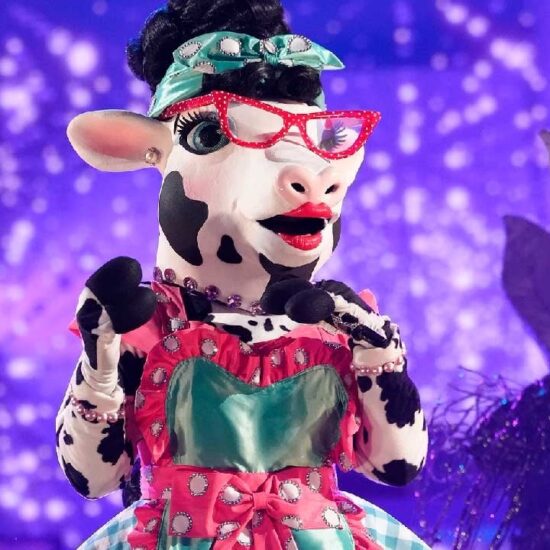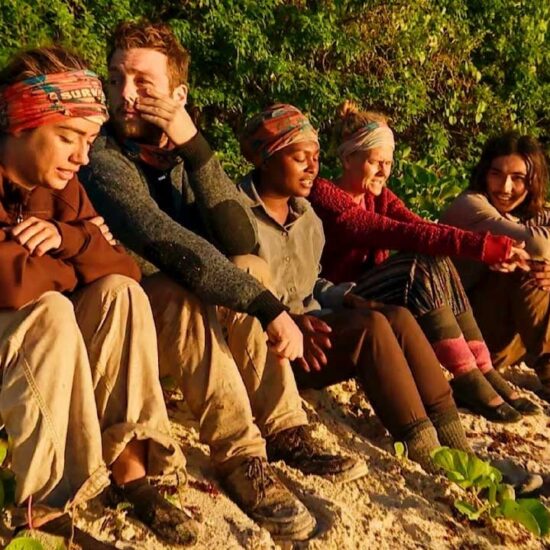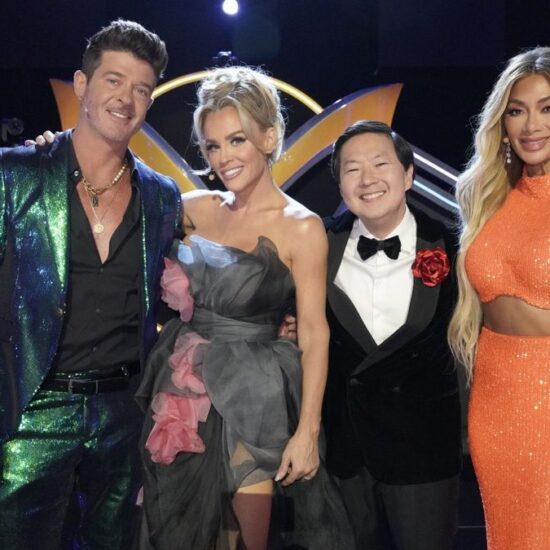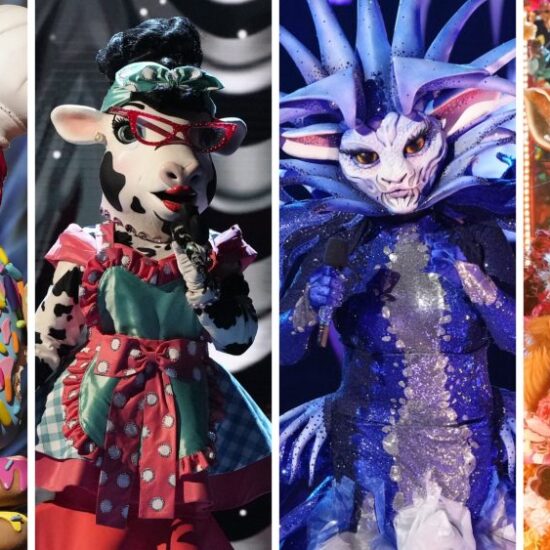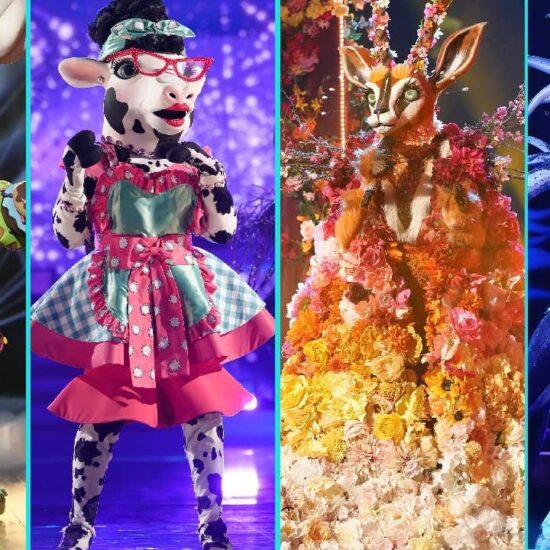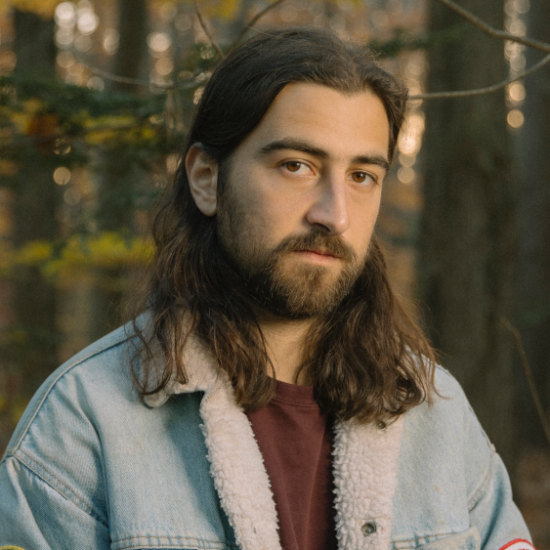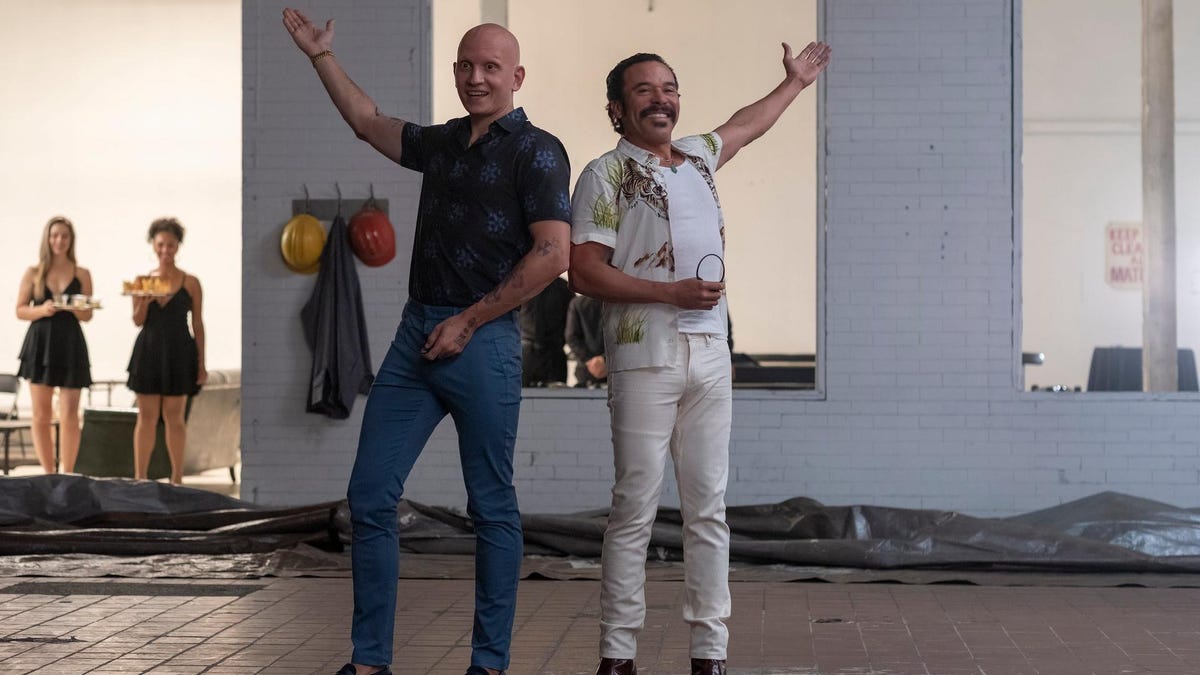
The sound of helicopters makes up most of the background noise on this week’s stellar episode of Barry, a show without a titular character, at least for these 30 minutes. Yet, the whirling blades serve as a reminder that the one hitman at the center of everyone’s personality crises is out there, evading the cops and on the hunt, coming for one of his former friends. Well, everyone but Fuches, whose lips are sealed shut with bruises thanks to the batons of his prison guards.
At the start of the episode, when the rotors start turning, we see Fuches, purple and bloodied, listening to the dulcet tones of his Dustin Hoffman’s escape. It really is just like Rain Man. Guards pounding on his cell door overpowers the noise above, reminding Fuches that he’ll pay the price for trying to save the cops a monster headache and a few headshots from last week’s massacre. He’ll bear the brunt for his friend, making him a jailhouse martyr. Fuches is the one person that seems to still be on his side, just as he has been all his life. No wonder Barry’s such a mess.
For the other two men in Barry’s life, his escape is an alarming development. At the behest of Tom and his son Leo (Andrew Leeds), Cousineau holes up at his cabin at Big Bear, where he gets no cell reception and an inconclusive answer as to whether or not Coral Street Cafe will deliver out there. When Tom calls with the news of Barry’s escape, Cousineau declares himself a “sitting fucking duck” and sits and waits for Barry to arrive with Rip Torn’s gun pointed right at the door.
Hank’s also worried about Barry, but even more immediately, about the returning Chechens. When we catch up with him amid Dave Wingo’s pulsating electronic score, Hank watches the skies like Fuches, keenly aware that the choppers are looking for their old friend. Since Toro failed to kill Barry last week because this is what happens when you hire two guys with a podcast, Hank’s likely regretting calling him a narcissistic, self-centered, murdering piece of shit. Still, the Chechens may be closer than Barry, and they disapprove of crime utopia and will probably kill Cristobal.
As apprehensive as Hank seems, Cristobal is bubbling over with pride. The sand will make him legitimate, and he and Hank can live like two Dorthys in Oz. Nevertheless, it’s time for his team to relax and party with free drinks, casino games, and snacks. Hader and his production designers know how to throw a sad party—put it in a big open space that would be impossible to fill.
The only one ignoring the helicopters is Sally, who is, surprisingly, on set with her new acting student Kristen. Sally’s return to set feels similar to the one-shot mayhem of “limonada” until we’re reminded that she’s on the set of Mega Girls because of Kristen. Still, she meets Academy Award-winning CODA writer/director Sian Heder, the latest filmmaker who went from working with committed actors to tell a deeply personal story to a movie about models in Halloween costumes fighting over a blue glowy thing infinity orb. Regardless, when people see Mega Girls, they’re going to think whoever made this made CODA. It’s an astute parody of the indie-to-Marvel pipeline that swallowed Chloe Zhao whole—even though Mega Girls looks more fun than Eternals.
As Sally’s fate flutters overhead, she has an opportunity in front of her. Seated behind the cameras as Kristen flubs her Mega Girls lines, Sally watches as her only pupil blows the chance that Sally never got. When Kristen goes full breakdown, something we’ve seen Sally do time and again, Sally provides the comfort only a mentor can offer. She attempts to lead Kristen through sense memory exercises, hoping to trigger some of those sacrificial moments Kristen can’t access, despite having dated a guy who was 5’3″, which is really short. Unfortunately, Kristen’s short-king trauma won’t cut it, and Sally uses Kristen as a sacrifice of her own, delivering Kristen’s lines directly to the camera and Heder, with some exquisite blocking that cuts Kristen out of the frame. Sally nails Kristen’s part. Now if only Heder could put those words in Kristen’s body.
Sally’s betrayal is light compared to what Hank has in store. Hank move the sand party to the silo where the crew check out the guest of honor. He leads Cristobal and the gaggle of doomed gangsters up the silo. The gangsters ignore Hank’s request to remove their shoes on the sand, and Cristobal ignores Hank’s other request—that his lover follow Hank out of the silo. After Hank leaves the room, we are left with a long shot of the gang and Cristobal in the center of the sand patch when the floor drops below them, burying Cristobal underneath his future fortune. No, Hank, he probably isn’t feeling like Scrooge McDuck.
The camera rushes over to Cristobal, stuck in the sand with his face and arm still exposed. As he calls for Hank, he sinks deeper with the sand muffling his cries for help. Hader’s clever use of sound here, raising and lowering the volume depending on where Cristobal and Hank are, puts the viewer in this experience and ratchets the tension. The darkness goes on forever as we ponder a world without Cristobal. Finally, when Hank begins pulling Cristobal out of the sand, the sound increases, and we can breathe a sigh of relief. However, there isn’t much respite on the other side of the silo.
When he comes to, Hank is surrounded by his old Chechen bosses, with Michael Ironside’s Andrei finally returning to the show. Through a series of powerful low-angle shots, Andrei towers over his old nemesis Cristobal as Hank shamefully lowers his head. No longer confined to a Zoom screen, Andrei’s appearance in Los Angeles cements Cristobal’s fate. It’s time to wake up now, Dorthy.
Hank’s betrayal begins one of the most heartwrenching scenes on the show. Michael Irby and Anthony Carrigan have such a strong foundation for their characters, playing both games (bloodthirsty warlord and fun, funky fresh couple) to perfection. But here, they’re human, in all their crying, imperfect glory. Hank pleads with Cristobal to accept the facts: The Chechens will wipe them out if they don’t fall in line, and to their credit, the Chechens welcome Cristobal, a former rival, with open arms. He’s Hank’s family, so he’s the Chechens’ family. But he still tries to lean into the reality of a lovers’ quarrel, saying they should sleep on it, take a beat, and hold off before doing anything too hasty.
Unlike, say, everyone else on the show, Cristobal finds Hank’s willingness to kill his new gang, men loyal to him and who would die for the promise of crime utopia, inhumane. Now who’s the narcissistic, self-centered, murdering piece of shit? Generally speaking, victims don’t matter to the people of Barry. They wait on the beach as Barry gives them a friendly wave. People commit murder regularly, and with such viciousness on the show, seeing someone consider the victim is rare. It’s something that Barry certainly tries to suppress—one of those things that he doesn’t want to be true. But in the bloodthirsty world of Hollywood and the cartels, to be a killer is a good thing. It makes men hard. But their dispute isn’t so different from all the conversations Barry had with Cousineau and Sally. If they don’t stay loyal to him, they’ll end up dead or in jail. Only he can keep them safe.
In the end, Cristobal walks out on Hank, sealing his fate. Hader reveals Cristobal’s corpse on the pavement outside Hank’s home with a Wes Anderson-level detachment—his body framed by the front door with a precise row of armed goons staring back at Hank. And like Anderson, the flat presentation and distant camera work only strengthen the emotion. Hank returns to the couch, begins breathing, and suppresses his pain. Carrigan is a raw nerve here, a man who has lost everything and has no one to blame it on but himself. It’s a beautiful and crushing scene for which Carrigan and Irby deserve all the praise in the world. It’s a brutal end to a lovely romance. But sandcastles aren’t meant to last forever.
The sacrifices didn’t end there. There’s still Gene Cousineau, seated in his rocker at Big Bear with Rip Torn’s gun pointed right at the door. Poor, stupid, trigger-happy Gene. When his son returns to deliver his old man some Coral Street Cafe, Cousineau fires a few rounds into the door, sending his son to the ground. Cousineau doesn’t even know. He leaves the scene with a very funny “fuck you” and rushes off. Leo is left gasping for breath in a situation eerily similar to the types of gun violence commonplace in the U.S. Domestic incidents make up most of the gun violence in this country.
Barry has long been a show about the ways violence and mayhem spread through society, often perpetrated by people who believe in their heart of hearts that they’re good. And yet, they still bury their employees in the sand, have their boyfriends killed, and shoot their sons. Heck, the only “good guy” in this episode is Fuches, who refuses to rat out Barry and earns Livewire and Groovetube’s respect in the process. At the end of the day, though, these characters commit their crimes and end up in the same place.
After attempting to steal Kristen’s role, Sally briefly chatted with Kristen’s agent about getting back in the game. She can work her way back in by being an acting coach for models. Unfortunately, Sally is back at square one and sees herself repeating patterns. When Kristen tells Sally that Barry escaped, she offers Sally a place to stay. It’s a nice offer, but it will only get Kristen killed. The longer people are near the “Entitled Vagina Woman,” the worse things become. So Sally heads home, confident Barry’s there. She’s right. Barry creeps from the shadows with an explanation, but Sally doesn’t need to hear him out. She’s ready to run off with him.
The last scene takes place in the fields where Barry grew up. Or so we thought. What was once the setting of a hallucination now indicates a time jump. In a house in the middle of some undeveloped plot of land lives Barry, Sally, and John, their son. Finally, it looks like Barry and Sally have outrun their problems and all the mayhem they have wrought. With four episodes left, we’ll see how it catches up with them.
Stray observations
- In an episode filled with harrowing moments, two line readings anchored me to the belief that this show is still a comedy above all else: The one gangster yelling “karaoke” and the CB radio in Moss’ car describing the Dave & Busters raid. “We ain’t finding any heats on these fools, mostly Powercards™. No sign of Hank or any gangsters at all. Just a bunch of Chargers fans and one guy in a Houston Oilers hat, which is confusing.”
- Another excellent line reading was Hader’s “Really.” This show jumps from comedy to drama with the ease of a Coen brothers movie. Bill Hader, please make a movie already.
- The raid on Dave & Busters beautifully paid off that bit of product placement.
- Does Gene know how to cut bread? Does he not buy sliced? Going right into the center of the loaf felt like such a choice.
- “Gene, I got to the bottom of the mountain and my cell just lept to life!”
“Can’t you just say, ‘I got service,’ like everybody else.” - I was hoping that we were seeing Barry and his brother arguing over Call Of Duty—though that was also the first sign that this is taking place now. Call Of Duty probably wasn’t around when Barry was a kid. Even more interesting, he’s never heard of Call Of Duty. Barry and Sally seem to be sheltering this kid far from society.
- It’s always a pleasure to see Michael Ironside, who is as menacing as ever when he assures Hank that Cristobal is family.
- I forgot to shout out Richard Riehle last week. Aside from playing a very threatening warden, Riehle also has a brief Office Space reunion opposite Stephen Root. This show is character-actor heaven.
- Seriously, how can we get Anthony Carrigan an Emmy?









